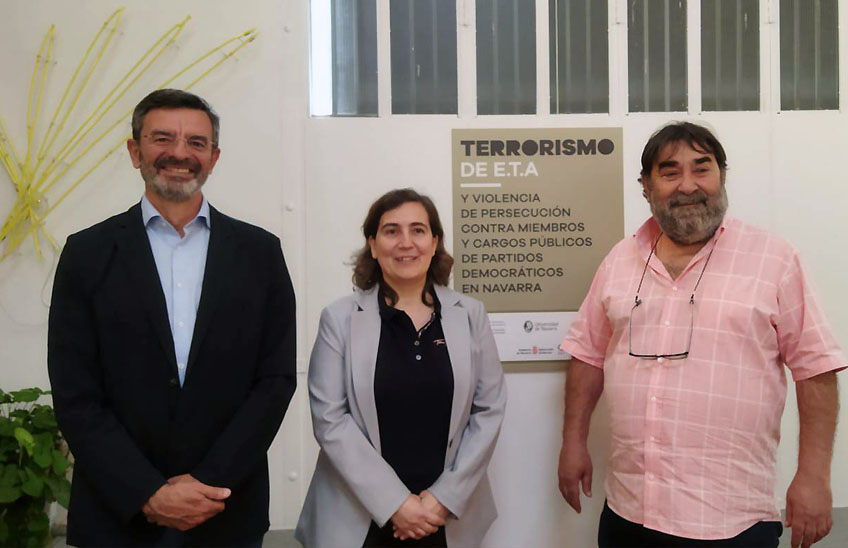A report analyses ETA terrorism and kale borroka against members and public officials of democratic parties in Navarre.
It has been prepared by researchers from I-Communitas of the Public University of Navarra and the ICS of the University of Navarra, coordinated by the high school of Sociology and Political Science of Navarra.

FotoCedida/Fromleft: Pablo Pérez, manager of the University of Navarra team; Marta Rodríguez, manager on behalf of the UPNA, and Manuel Rodríguez, Dean of the high school of Sociology and Political Science of Navarra.
14 | 07 | 2022
A report elaborated by the Public University of Navarra and the University of Navarra has analyzed the terrorism of ETA and the kale borroka against members and public officials of democratic parties in Navarra. The work has been carried out by researchers from the Institute of Advanced Social research (I-Communitas) and Institute for Culture and Society (ICS), coordinated by the high school of Sociology and Political Science of Navarra, in compliance with the agreement signed by the latter with the General Administration of Peace, Coexistence and Human Rights of the Government of Navarra.
The project has been developed in two phases. In the first phase, at position of the ICS, the historical framework has been elaborated, which temporally frames the reference letter of the research. "Contexto sociopolítico de la persecución a personas que ocupan cargos electos en Navarra (1958-2010)" was developed by Pablo Pérez López and Leyre Santos Vidal; and "Violencia de persecución. A comparative approach", by María Jiménez Ramos.
Likewise, in this phase, I-Communitas has conceptualised and identified the violence of persecution that took place in the Basque Country and Navarre, through Marta Rodríguez Fouz 's work "report cívica y reconocimiento. Commitment to truth, justice, reparation and non-repetition".
As for the second phase, interviews were carried out with 57 politicians who suffered the violence of persecution: 26 members of the Socialist Party of Navarre (PSN); 26 members of the Union of the People of Navarre (UPN) and 5 members of the Popular Party (PP). A focal group has also been organised with the participation of 3 members of the PSN and 3 of the UPN. Lohitzune Zuloaga Lojo and Sergio García Magariño, both members of I-Communitas, have joined this phase. Marta Rodríguez Fouz and María Jiménez Ramos analysed the material collected.
Recognition of members and public officials of democratic parties
From agreement with the researchers, the report is framed within the purpose of recognition towards members and public officials of democratic parties, with particular attention to the Foral Community of Navarre, seeking to show the experience of those who suffered this harassment and violence of persecution as a consequence of their commitment to politics. It aims to highlight the personal consequences of this generous contribution to the political life of their community, submission .
As they explain, the narrative that can be constructed from these testimonies will contribute to a better understanding of the past and do justice to the report of these victims, whose experiences would otherwise end up being lost in intimate accounts as if they had never happened.
agreement According to report, most of the politicians who were threatened and persecuted by ETA remember the suffering they experienced with pain but say that they would "do it all over again". It also concludes that the defence of democracy, resistance to terrorism or the creation of electoral lists in towns with a nationalist majority were decisive for those interviewed to get involved in politics, even if this meant becoming goal of the violence of persecution.
At presentation during press conference, Pablo Pérez claimed that these public officials carried out a dangerous activity "precisely because it was" and because they were aware of the risk of democracy "being shut down".
As indicated in the document, the nationalist left "supported and put on internship the violence of persecution against their political adversaries" and the intimidation was particularly serious in those cases where they were notified of the appearance in ETA documentation or the imminence of an attack against them that had been thwarted.
Commitment to the defence of democracy
He adds that fear permeated the experiences of those threatened and constituted a determining element in the development of political life, something that was extremely complicated when it affected the family and, in particular, the children.
Harassment of public officials was more accentuated in the towns in the north of Navarre and in the Pamplona region, according to the study, which highlights that this harassment "was carried out with impunity", even during municipal plenary sessions and in festive contexts.
All interviewees remained committed to defending democracy and political pluralism despite the pressure of violence, and the memory of murdered comrades helped them to continue.
The assassination of Tomás Caballero in 1998 initiated the assignment of bodyguards to members of UPN, PP, CDN and PSN, which was systematised after the assassination of José Javier Múgica in 2001. Between 2001 and 2015, the study reveals, a total of 659 people have lived under escort in Navarre, of which 523 were politicians.
The study concludes that threatened public officials "are torn between the memory of the irreparable damage caused by terrorism and the conviction that the defence of democracy was worth their sacrifice".
